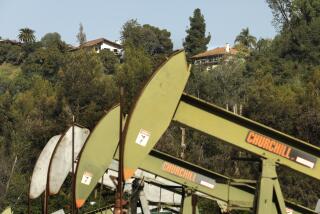Government issues tighter rules for deep-water drilling
Reporting from Washington â The Interior Department, moving closer to lifting a moratorium on offshore oil and gas drilling, issued new rules Thursday aimed at improving safety after the BP oil spill.
Administration officials and independent experts said the rules are an important step toward resumption of deep-water oil and gas exploration, which was halted in response to the explosion of the Deepwater Horizon rig that killed 11 men and spewed 4.9 million barrels of oil into the Gulf of Mexico.
âThere are a series of technological and safety reforms that this administration is very serious about implementing, that need to be implemented and secured prior to the lifting of that moratorium,â said White House Press Secretary Robert Gibbs.
The new requirements are contained in two multifaceted rules, âthe drilling safety ruleâ and âthe workplace safety rule.â They make June recommendations issued by the Interior Department mandatory for oil and gas companies drilling in the gulf.
Workers on the Deepwater Horizon rig have testified to a federal investigative panel about shortcuts they believe were taken during the drilling of BPâs Macondo well. The drilling safety rule tightens standards for the use of drilling fluids, well-bore casing and cementing in an exploratory well.
The rule also explicitly requires companies to improve the efficacy of blowout preventers, the tall structures that sit atop underwater wellheads and are meant to seal them in case of an explosion.
BPâs blowout preventer failed to shear the drilling pipe, which resulted in the well gushing oil for 86 days.
The workplace safety rule requires oil companies to rethink their worst-case scenarios for accidents and spills and to come up with viable plans for dealing with them.
Oil industry experts and some environmentalists gave the new rules strong marks.
âOne of the things that happened with Macondo is that it exposed gaps in a range of processes and equipment that were legally compliant but not necessarily best practice,â said Frank Verrastro, a former oil executive and now director of the Energy and National Security Program at the Center for Strategic and International Studies, a Washington research group.
The Interior Department âhas narrowed the band of acceptable behaviors and practices with an eye toward improving safety and well control,â he said. âI think itâs a good thing, and industry should think itâs a good thing too.â
Members of the oil industry responded with measured approval to the rules, which are based in part on recommendations by an industry task force that was convened after the April 20 blowout. Many oil companies in the Gulf of Mexico had already been working to improve their drilling and safety practices since the explosion and the Interior Departmentâs recommendations.
But companies continued to ask for a speedy end to the moratorium.
âWe hope this will lead to the swift lifting of the drilling moratorium and clarity, which will allow [the Bureau of Ocean Energy Management] to speed the pace of issuing drilling permits,â Chevron Corp. said in a statement. The Interior Department and the bureau now need âto help put thousands of people back to work in the Gulf of Mexico,â it said.
In July, the Interior Department imposed a moratorium on the 33 or so deep-water drilling rigs active in the gulf, asserting that if another blowout were to occur, the government would be unable to respond adequately.
Oil and gas are still being extracted at about 600 production platforms in water more than 1,000 feet deep. There is no moratorium on drilling in shallow waters. Gulf oil and gas account for 30% of domestic production, and the biggest, most promising hydrocarbon reservoirs are under miles of water and seabed.
The oil industry and Gulf Coast politicians have argued that the deep-water moratorium would destroy the local economy and drive rigs away to other countries. Louisiana Democratic Sen. Mary L. Landrieu has blocked the nomination of Jack Lew as director of the Office of Management and Budget to protest the moratorium.
So far, losses of jobs and drilling rigs have been far fewer than predicted. The moratorium is due to expire at the end of November.
But the oil industryâs anxiety stems from uncertainty about what will happen once the moratorium ends. Drilling will not quickly resume at the level it was prior to the Deepwater Horizon explosion, because permits will be needed for the array of new safety and drilling requirements spelled out in the new rules.
Industry representatives have pointed out that over the last five months, about half a dozen permits to drill in shallow waters have been issued. Before the BP rig explosion, the Interior Department approved 10 to 12 permits a month, said Andy Radford, senior policy advisor for offshore issues at the American Petroleum Institute.
âNow we have new technical requirements and third-party verification requirements and new equipment inspection requirements and new well-design requirements; the industry will adapt to and meet them, but it means an increase in workload,â Radford said.
More to Read
Sign up for Essential California
The most important California stories and recommendations in your inbox every morning.
You may occasionally receive promotional content from the Los Angeles Times.











